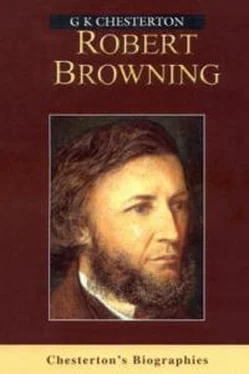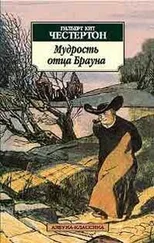Гилберт Честертон - Robert Browning
Здесь есть возможность читать онлайн «Гилберт Честертон - Robert Browning» весь текст электронной книги совершенно бесплатно (целиком полную версию без сокращений). В некоторых случаях можно слушать аудио, скачать через торрент в формате fb2 и присутствует краткое содержание. Год выпуска: 2014, Издательство: epubBooks Classics, Жанр: Биографии и Мемуары, на английском языке. Описание произведения, (предисловие) а так же отзывы посетителей доступны на портале библиотеки ЛибКат.
- Название:Robert Browning
- Автор:
- Издательство:epubBooks Classics
- Жанр:
- Год:2014
- ISBN:нет данных
- Рейтинг книги:5 / 5. Голосов: 1
-
Избранное:Добавить в избранное
- Отзывы:
-
Ваша оценка:
- 100
- 1
- 2
- 3
- 4
- 5
Robert Browning: краткое содержание, описание и аннотация
Предлагаем к чтению аннотацию, описание, краткое содержание или предисловие (зависит от того, что написал сам автор книги «Robert Browning»). Если вы не нашли необходимую информацию о книге — напишите в комментариях, мы постараемся отыскать её.
Robert Browning — читать онлайн бесплатно полную книгу (весь текст) целиком
Ниже представлен текст книги, разбитый по страницам. Система сохранения места последней прочитанной страницы, позволяет с удобством читать онлайн бесплатно книгу «Robert Browning», без необходимости каждый раз заново искать на чём Вы остановились. Поставьте закладку, и сможете в любой момент перейти на страницу, на которой закончили чтение.
Интервал:
Закладка:
Thus, Mr. Santayana is, perhaps, the most valuable of all the Browning critics. He has gone out of his way to endeavour to realise what it is that repels him in Browning, and he has discovered the fault which none of Browning's opponents have discovered. And in this he has discovered the merit which none of Browning's admirers have discovered. Whether the quality be a good or a bad quality, Mr. Santayana is perfectly right. The whole of Browning's poetry does rest upon primitive feeling; and the only comment to be added is that so does the whole of every one else's poetry. Poetry deals entirely with those great eternal and mainly forgotten wishes which are the ultimate despots of existence. Poetry presents things as they are to our emotions, not as they are to any theory, however plausible, or any argument, however conclusive. If love is in truth a glorious vision, poetry will say that it is a glorious vision, and no philosophers will persuade poetry to say that it is the exaggeration of the instinct of sex. If bereavement is a bitter and continually aching thing, poetry will say that it is so, and no philosophers will persuade poetry to say that it is an evolutionary stage of great biological value. And here comes in the whole value and object of poetry, that it is perpetually challenging all systems with the test of a terrible sincerity. The practical value of poetry is that it is realistic upon a point upon which nothing else can be realistic, the point of the actual desires of man. Ethics is the science of actions, but poetry is the science of motives. Some actions are ugly, and therefore some parts of ethics are ugly. But all motives are beautiful, or present themselves for the moment as beautiful, and therefore all poetry is beautiful. If poetry deals with the basest matter, with the shedding of blood for gold, it ought to suggest the gold as well as the blood. Only poetry can realise motives, because motives are all pictures of happiness. And the supreme and most practical value of poetry is this, that in poetry, as in music, a note is struck which expresses beyond the power of rational statement a condition of mind, and all actions arise from a condition of mind. Prose can only use a large and clumsy notation; it can only say that a man is miserable, or that a man is happy; it is forced to ignore that there are a million diverse kinds of misery and a million diverse kinds of happiness. Poetry alone, with the first throb of its metre, can tell us whether the depression is the kind of depression that drives a man to suicide, or the kind of depression that drives him to the Tivoli. Poetry can tell us whether the happiness is the happiness that sends a man to a restaurant, or the much richer and fuller happiness that sends him to church.
Now the supreme value of Browning as an optimist lies in this that we have been examining, that beyond all his conclusions, and deeper than all his arguments, he was passionately interested in and in love with existence. If the heavens had fallen, and all the waters of the earth run with blood, he would still have been interested in existence, if possible a little more so. He is a great poet of human joy for precisely the reason of which Mr. Santayana complains: that his happiness is primal, and beyond the reach of philosophy. He is something far more convincing, far more comforting, far more religiously significant than an optimist: he is a happy man.
This happiness he finds, as every man must find happiness, in his own way. He does not find the great part of his joy in those matters in which most poets find felicity. He finds much of it in those matters in which most poets find ugliness and vulgarity. He is to a considerable extent the poet of towns. "Do you care for nature much?" a friend of his asked him. "Yes, a great deal," he said, "but for human beings a great deal more." Nature, with its splendid and soothing sanity, has the power of convincing most poets of the essential worthiness of things. There are few poets who, if they escaped from the rowdiest waggonette of trippers, could not be quieted again and exalted by dropping into a small wayside field. The speciality of Browning is rather that he would have been quieted and exalted by the waggonette.
To Browning, probably the beginning and end of all optimism was to be found in the faces in the street. To him they were all the masks of a deity, the heads of a hundred–headed Indian god of nature. Each one of them looked towards some quarter of the heavens, not looked upon by any other eyes. Each one of them wore some expression, some blend of eternal joy and eternal sorrow, not to be found in any other countenance. The sense of the absolute sanctity of human difference was the deepest of all his senses. He was hungrily interested in all human things, but it would have been quite impossible to have said of him that he loved humanity. He did not love humanity but men. His sense of the difference between one man and another would have made the thought of melting them into a lump called humanity simply loathsome and prosaic. It would have been to him like playing four hundred beautiful airs at once. The mixture would not combine all, it would lose all. Browning believed that to every man that ever lived upon this earth had been given a definite and peculiar confidence of God. Each one of us was engaged on secret service; each one of us had a peculiar message; each one of us was the founder of a religion. Of that religion our thoughts, our faces, our bodies, our hats, our boots, our tastes, our virtues, and even our vices, were more or less fragmentary and inadequate expressions.
In the delightful memoirs of that very remarkable man Sir Charles Gavan Duffy, there is an extremely significant and interesting anecdote about Browning, the point of which appears to have attracted very little attention. Duffy was dining with Browning and John Forster, and happened to make some chance allusion to his own adherence to the Roman Catholic faith, when Forster remarked, half jestingly, that he did not suppose that Browning would like him any the better for that. Browning would seem to have opened his eyes with some astonishment. He immediately asked why Forster should suppose him hostile to the Roman Church. Forster and Duffy replied almost simultaneously, by referring to "Bishop Blougram's Apology," which had just appeared, and asking whether the portrait of the sophistical and self–indulgent priest had not been intended for a satire on Cardinal Wiseman. "Certainly," replied Browning cheerfully, "I intended it for Cardinal Wiseman, but I don't consider it a satire, there is nothing hostile about it." This is the real truth which lies at the heart of what may be called the great sophistical monologues which Browning wrote in later years. They are not satires or attacks upon their subjects, they are not even harsh and unfeeling exposures of them. They are defences; they say or are intended to say the best that can be said for the persons with whom they deal. But very few people in this world would care to listen to the real defence of their own characters. The real defence, the defence which belongs to the Day of Judgment, would make such damaging admissions, would clear away so many artificial virtues, would tell such tragedies of weakness and failure, that a man would sooner be misunderstood and censured by the world than exposed to that awful and merciless eulogy. One of the most practically difficult matters which arise from the code of manners and the conventions of life, is that we cannot properly justify a human being, because that justification would involve the admission of things which may not conventionally be admitted. We might explain and make human and respectable, for example, the conduct of some old fighting politician, who, for the good of his party and his country, acceded to measures of which he disapproved; but we cannot, because we are not allowed to admit that he ever acceded to measures of which he disapproved. We might touch the life of many dissolute public men with pathos, and a kind of defeated courage, by telling the truth about the history of their sins. But we should throw the world into an uproar if we hinted that they had any. Thus the decencies of civilisation do not merely make it impossible to revile a man, they make it impossible to praise him.
Читать дальшеИнтервал:
Закладка:
Похожие книги на «Robert Browning»
Представляем Вашему вниманию похожие книги на «Robert Browning» списком для выбора. Мы отобрали схожую по названию и смыслу литературу в надежде предоставить читателям больше вариантов отыскать новые, интересные, ещё непрочитанные произведения.
Обсуждение, отзывы о книге «Robert Browning» и просто собственные мнения читателей. Оставьте ваши комментарии, напишите, что Вы думаете о произведении, его смысле или главных героях. Укажите что конкретно понравилось, а что нет, и почему Вы так считаете.










